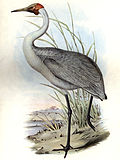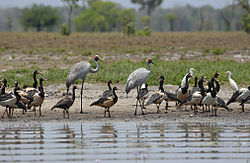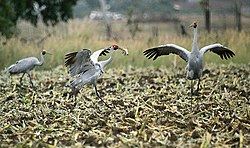Brolga
The brolga (Grus rubicunda) is a bird in the family Gruidae. It lives in Australia.[2]
| Brolga | |
|---|---|

| |
| Conservation status | |
| Scientific classification | |
| Kingdom: | Animalia |
| Phylum: | Chordata |
| Order: | Gruiformes |
| Family: | Gruidae |
| Genus: | Grus |
| Species: | G. rubicunda
|
| Binomial name | |
| Grus rubicunda | |
| Synonyms | |
|
Antigone rubicunda | |
Only two cranes live in Australia, the brolga and the sarus crane.[2]
Appearance
This is the largest bird in Australia that can fly. (The emu is larger but does not fly.) It is 1.3 metres tall and its wings stretch 2.5 metres from end to end. Its feathers are light gray except under the chin, and there is some red skin on its neck. it has long black legs.[2]
Young brolgas are darker gray with no red or black.[2]
Habitat and food
The brolga looks for food in swamps and other wetlands. It will put its head all the way under the water. It can look for food in drier places, like grasslands and farms, but it goes to wetlands when it can.[2]
The brolga digs into the ground with its strong bill. It pries up bits of earth. It eats the roots of sedge plants the most, but it also eats molluscs, frogs, crustaceans, and large insects.[2]
Breeding
Brolga dance for each other. It jumps in the air, stretches down and up, throws things into the air, and makes loud noises.[2]
Brolga make nests. They build a platform out of mud, grass, and sticks. They build it on an island or even in the water. They have two eggs at a time.[2]
Threats
The brolga suffers from habitat loss because humans drain their swamps to make farmland and control floods. Long ago, farmers poisoned brolga so they would not eat crops.[2]
Brolga Media
An 1865 brolga illustration from Birds of Australia by John Gould
A pair of brolgas amongst other waterbirds in the Northern Territory
Pair at nest at Healesville Sanctuary near Melbourne
References
- ↑ Template:Cite IUCN
- ↑ 2.0 2.1 2.2 2.3 2.4 2.5 2.6 2.7 2.8 "Brolga - profile". New South Wales Office of Environment and Heritage. April 2, 2020. Retrieved September 3, 2021.






